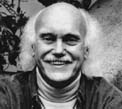
Ram Dass
Richard Alpert (Ram Dass) was born in 1931. His father, George, a lawyer, helped to found Brandeis University and was President of the New York, New Haven & Hartford Railroad. Ram Dass studied psychology, specializing in human motivation and personality development. He received an M.A. from Wesleyan and a Ph.D. from Stanford. He then served on the psychology faculties at Stanford and the University of California, and from 1958 to 1963 taught and researched in the Department of Social Relations and the Graduate School of Education at Harvard University. During this period he co-authored (with Sears and Rau) the book Identification and Child Rearing, published by Stanford University Press.
In 1961, while at Harvard, Ram Dass' explorations of human consciousness led him, in collaboration with Timothy Leary, Ralph Metzner, Aldous Huxley, Allen Ginsberg, and others, to pursue intensive research with psilocybin, LSD-25, and other psychedelic chemicals. Out of this research came two books:The Psychedelic Experience (co-authored by Leary and Metzner, and based on The Tibetan Book of the Dead, published by University Books); and LSD (with Sidney Cohen and Lawrence Schiller, published by New American Library). Because of the controversial nature of this research, Ram Dass was dismissed from Harvard in 1963.
Ram Dass continued his research under the auspices of a private foundation until 1967. In that year he traveled to India, where he met his Guru (spiritual teacher), Neem Karoli Baba. Ram Dass studied yoga and meditation, and received the name Ram Dass, which means "servant of God." Since 1968, he has pursued a variety of spiritual practices, including guru kripa; devotional yoga focused on the Hindu spiritual figure Hanuman; meditation in the Theravadin, Mahayana Tibetan, and Zen Buddhist schools; karma yoga; and Sufi and Jewish studies.
Alpert continued his research under the auspices of a private foundation until 1967, when he traveled to India. In India, he met his guru, or spiritual teacher, Neem Karoli Baba, affectionately known as Maharaji. Maharaji gave Ram Dass his name, which means "servant of God." Since 1968, Ram Dass has pursued a variety of spiritual methods and practices from various ancient wisdom traditions, including devotional yoga focused on the Hindu spiritual figure Hanuman; meditation in the Theravadin, Mahayana Tibetan and Zen Buddhist schools; karma yoga; and Sufi and Jewish studies. He also practices service to others as a spiritual path.
In 1974, Ram Dass created the Hanuman Foundation, which developed the Prison Ashram Project, designed to help prison inmates grow spiritually during their incarceration, and the Dying Project, conceived as a spiritual support structure for conscious and dying. These projects are now directed under independent auspices. The Ram Dass Tape Library Foundation serves as the organizing vehicle for Ram Dass' teachings, and for the distribution of his books and tapes.
Ram Dass' interests include the support of psychedelic research, international development, environmental awareness and political action. He has written a number of spiritual books including Be Here Now, published in 1971 (over one million copies sold, 37th printing, Crown Publishers); The Only Dance There Is (Anchor/ Doubleday); Grist for the Mill (with Stephen Levine, Celestial Arts); Journey of Awakening (Bantam Books); Miracle of Love: Stories of Neem Karoli Baba (Hanuman Foundation); How Can I Help? (with Paul Gorman, Knopf); Compassion in Action: Setting Out on the Path of Service (with Mirabai Bush, Bell Tower Press) and Still Here: Embracing Aging, Changing and Dying (Riverhead Books). His latest book, One-Liners: A Mini-Manual for a Spiritual Life was published by Bell Tower Press in September, 2002. In September, 2004, Harmony will be publishing Ram Dass' next book, entitled Paths to God: Living the Bhagavad Gita.
In 1996, Ram Dass began to develop plans for a talk radio program called “Here and Now with Ram Dass.” Seven pilot programs were aired in Los Angeles and the San Francisco Bay Area, and Ram Dass planned to launch the show on a nationwide basis the following year. But in February 1997, he experienced a stroke which left him with expressive aphasia and partial paralysis. The after effects of the stroke have made it necessary for him to postpone plans for his radio program, but he has been able to resume his other teaching commitments and is using the experience to explore the spiritual dimensions of suffering and the nature of the aging process.
Ram Dass is a co-founder and advisory board member of the Seva Foundation, an international service organization. He works with the Social Venture Network, an organization of businesses seeking to bring social consciousness to business practices. He continues to teach about the nature of consciousness, and about service as a spiritual path.